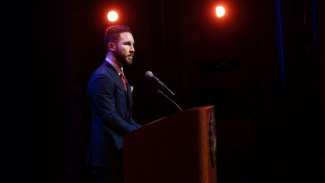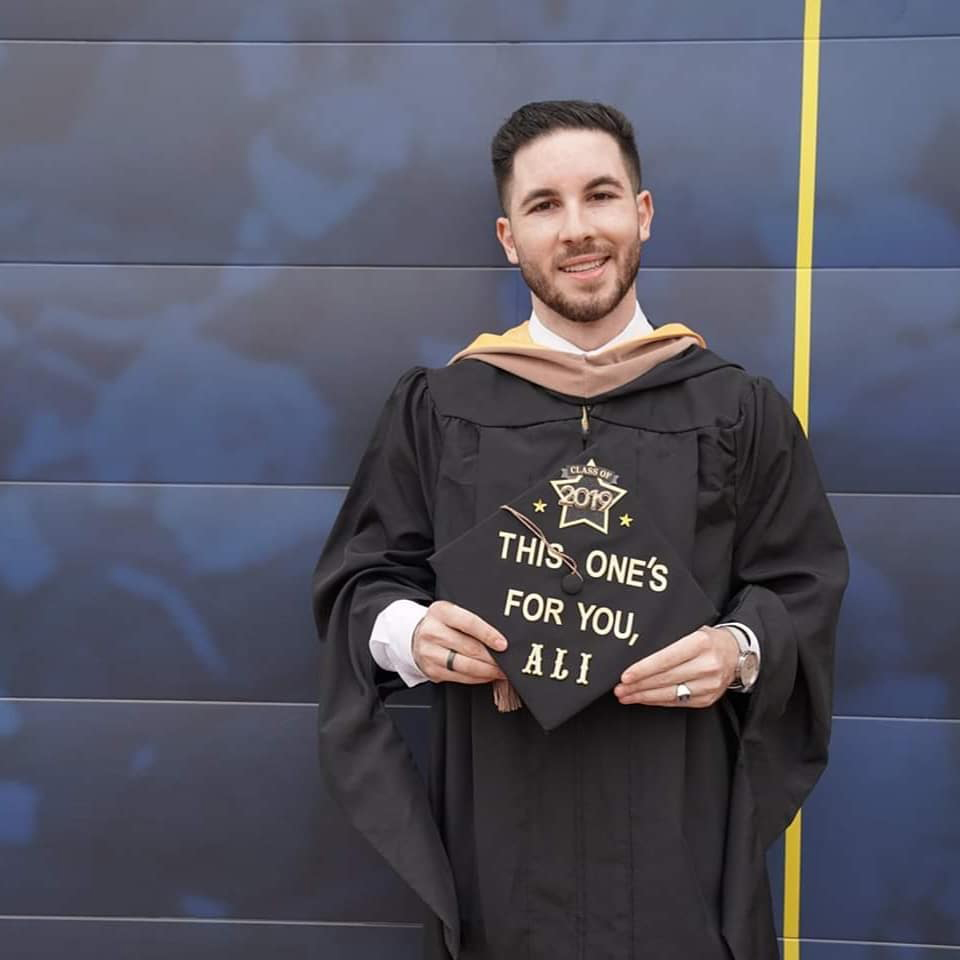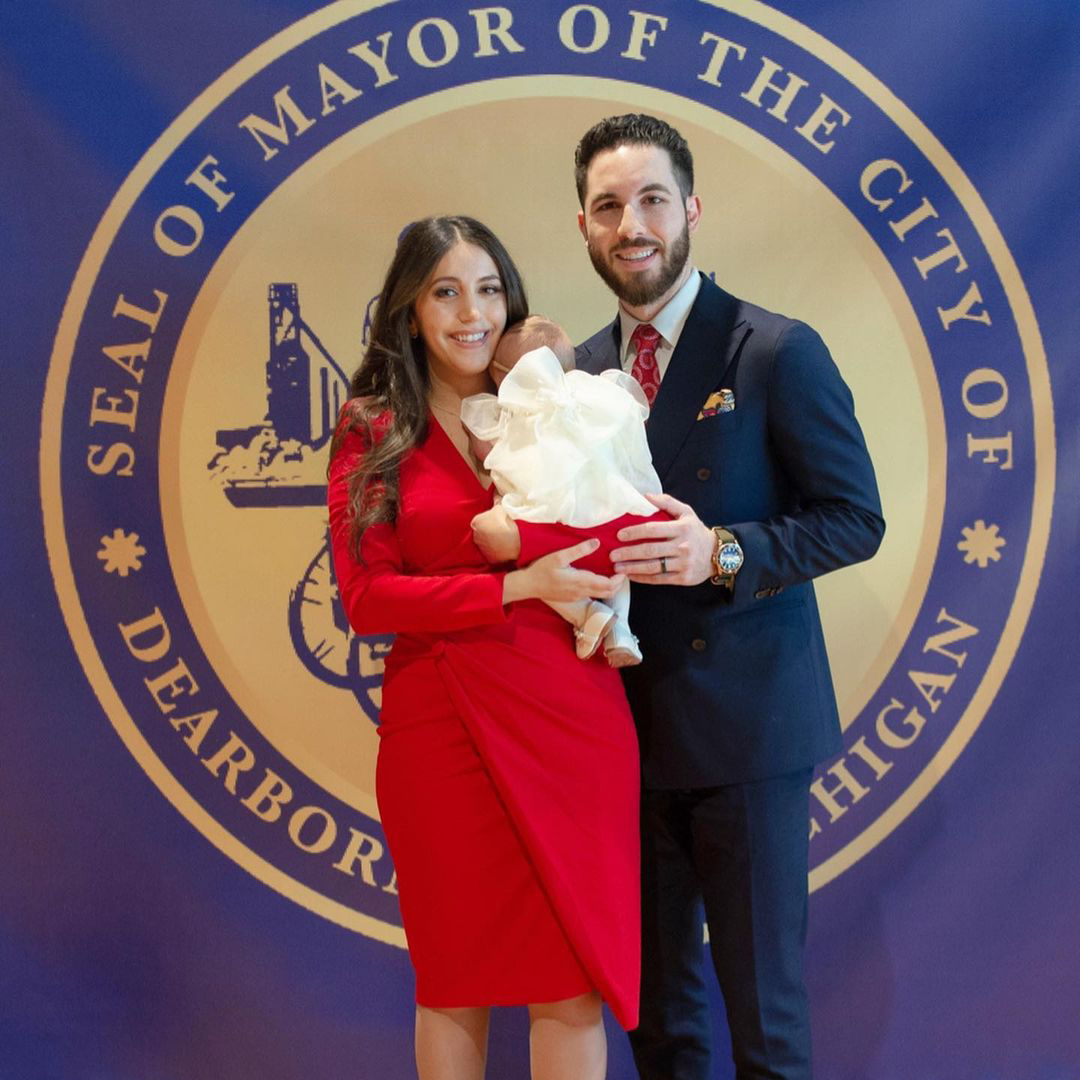Abdullah Hammoud, MBA ’19: Dearborn’s First Arab-American, Muslim Mayor

During a city sledding event, a young Palestinian girl walked up to Abdullah Hammoud, MBA ’19, Dearborn’s first Arab-American, Muslim mayor. She asked: “Mr. Mayor Abdullah, when you become president, will you remember me?”
Hammoud knelt down and told the girl, “You’re going to become the president and I need you to remember me.
“I saw her again for March is Reading Month. She looked at me and she said, ‘I’m going to remember you when I become president,’” Hammoud, 32, recalled. “To me, that is worth everything. That is the sacrifice. It’s worth it.”
For Hammoud, the son of Lebanese immigrants, success isn’t about being the first. It’s about opening the door of opportunity for others.
‘No work is embarrassing’
Growing up in Dearborn, Hammoud had no idea his family was poor. He recalls blissful summer days playing outside with his siblings and cousins, eagerly anticipating visits from the ice cream truck. But, as a teenager, he learned the truth about his family’s position.
One day, a debt collector called. When his father heard Hammoud give out their address, he snatched the phone away and then stormed off. A few days later, a bill came in the mail. Suddenly, Hammoud understood why they sometimes stayed with his uncle and had lived in 12 different homes by the time he was 14.
As immigrant parents of five children, his father and mother often struggled to make ends meet. Hammoud’s father worked as a truck driver and a gas station clerk, among other odd jobs, to provide for their family.
“My father and my mother always taught me, there’s a phrase in Arabic, ‘no work is embarrassing,’” Hammoud says. “So, I worked pretty much my whole life.”
‘Life is short and nothing is guaranteed’
That hustle — and brotherly love — is what led Hammoud to pursue an MBA at the Ross School of Business.
“My brother, Ali, and I were very entrepreneurial. We had a million ideas for all of these businesses we wanted to launch,” Hammoud said. “We always talked about how we wanted to go get our MBAs at Ross together because we wanted to elevate our business understanding.”
Initially, though, the brothers took different paths.
Ali earned a bachelor’s degree in business from the University of Michigan-Dearborn and became one of Quicken Loans’ youngest directors.
Abdullah earned a bachelor’s degree in biology from U-M Dearborn and, by age 20, a master’s degree in public health, epidemiology, and genetics at U-M Ann Arbor. He dreamed he’d become a physician, but after receiving numerous rejections, he realized medical school wasn’t in the cards for him.
Instead, he went to work for Professor Marianne Udow-Phillips at the nonprofit Center for Health and Research Transformation at the University of Michigan. During his time at the think tank, Hammoud took a sabbatical to volunteer with the United Nations in Jordan. He focused on increasing the quality of life among refugees in the Middle East.
“While I was there, I realized policy was this great lever for change,” Hammoud said. “But no one who looked like me, sounded like me, or had a name like me really had a finger on that lever.”
When he returned to Michigan, Hammoud took a job with the Henry Ford Health System. His goal was to climb the corporate ladder and make change as a healthcare executive. He was well on his way when tragedy struck. At age 25, he landed an interview to become a top advisor of one of the nation's largest health systems. During the interview process, his beloved older brother, Ali, passed away unexpectedly.
“When he passed away, I stopped. I canceled everything,” Hammoud said. “I asked myself: What’s the purpose of life? I was pursuing financial opportunity, largely because I grew up a poor kid and I never wanted to struggle over bills. I saw how my parents struggled and I never wanted to be wary of what could end up in my mailbox. But, I realized that life is short and nothing is guaranteed.”
That’s when destiny intervened.
Making Ross dreams come true

Shortly after his brother’s death, Abdullah received a packet in the mail from Ali’s former employer, Quicken Loans. It detailed the myriad ways Ali had made a positive impact on his co-workers. The company established a national leadership award in his honor.
In quick succession, Hammoud began to hear from people urging him to run for the 15th District seat in the state House. At first, he demurred. It was too soon after his brother’s death. But the calls kept coming, including from his mentor, Professor Marian Udow-Phillips at U-M.
“My brother passed away October 15 and, in January, I thought: Why not give back to my community, be that uplifting voice for them, just as my brother did for everyone else?” Hammoud said. “I tossed my name into the race not knowing what I would be jumping into. The rest kind of wrote itself.”
Hammoud won in a landslide and became the first Arab-American and Muslim to represent the 15th district, which includes part of Dearborn. He served in the position for five years.
While campaigning, Hammoud also applied and was accepted to Michigan Ross to pursue an MBA, as he and his brother had dreamed of doing.
The business degree for me is one of the most valuable things I ever pursued.
“At graduation, on my cap, I wrote: ‘This one’s for you, Ali.’ It was a degree that we both wanted to get. It was something that I was intent on getting," Hammoud said. "I got my letter of acceptance on his birthday in 2016. It was amazing.”
‘Don’t shy away from who you are’

Today, Hammoud serves as Dearborn’s seventh mayor. His platform includes investing in infrastructure, improving public health and safety, and delivering quality services while lowering the tax burden on residents.
“I’m handling a $130 million budget. That’s something that, without Ross, I wouldn’t be able to speak about confidently. You’re talking about cost allocation, what’s a cost center, what’s a profit center? How are you applying operational efficiencies and how do you increase value? These are all things that I picked up at Ross that I apply every day. It allows me to connect with my finance director, my budgeting director,” Hammoud said. “When I speak before my council, which technically are the appropriators of the money, they understand that I speak through the lens of a Ross graduate.”
There is one resident of Dearborn who motivates Hammoud more than anyone else. In December, he and his wife, Dr. Fatima Beydoun, welcomed their first child. Hammoud says envisioning his daughter’s future in the city guides his decision-making every day. He hopes his hometown will be a welcoming place where she — as a Muslim, Lebanese-American — can experience even more opportunities than he did.
Success as mayor comes not from being first, but from being the best, Hammoud says. He aims to do such a good job that, in the future, when someone whose identity is different from the majority runs for office, voters will say: “Remember when Abdullah did it? He did just fine. This person can as well.”
To all the Ross students, graduates, alums, and prospective students: My advice is, don’t shy away from who you are. Share that story. Speak power to that story. I think you’re going to see reward for doing that.







